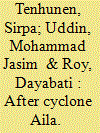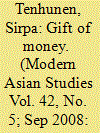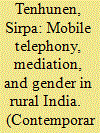|
|
|
Sort Order |
|
|
|
Items / Page
|
|
|
|
|
|
|
| Srl | Item |
| 1 |
ID:
190941


|
|
|
|
|
| Summary/Abstract |
This article compares the politics of climate change in the Sundarbans region in Bangladesh and India based on ethnographic fieldwork in four villages and among migrants from these villages in Kolkata and Khulna city by focusing on the long aftermath of cyclone Aila. The comparison highlights different policy options and framings of extreme weather events . Ten years after the cyclone, the aftermath of Aila continues in both regions we studied in Bangladesh and India, but partly for different reasons. In our study areas in Bangladesh, the aftermath of Aila reinforced the neglect of coastal livelihoods, whereas, in the communities we studied in India, Aila spurred new investments in the affected areas. By comparing how the political is interwoven with the natural, we demonstrate how Aila's lingering impacts have emerged as part of local power relationships and diverse forms of agency. We highlight the multiplicity of policy responses and people's practices not only between communities and countries facing a similar predicament but also within the communities themselves. We argue that the politics of climate change is not only about climate change policy to mitigate the impact of ecological disasters but also about the reconstruction of political agents and practices.
|
|
|
|
|
|
|
|
|
|
|
|
|
|
|
|
| 2 |
ID:
084842


|
|
|
|
|
| Publication |
2008.
|
| Summary/Abstract |
This article examines the rise of dowry system in Janta, a West Bengali village in the Bankura district, where the dowry payments are a relatively new phenomenon. The oldest generation in Janta had experienced times when no demands for money or other gifts had been made during marriage arrangements, but since the 1950s huge dowry payments have become the central financial transactions in the region. In addition to oral history interviews on dowry practices, I draw from my research on the changes in caste, gender and class relationships in the village. I argue that the dowry payments do not merely represent economic considerations in a class conscious society, but that they reflect a rearticulation of both the tradition and market, of gender, ritual, and class identities, and that paying attention to the multiplicity and local variation of dowry practices provides a key to its
|
|
|
|
|
|
|
|
|
|
|
|
|
|
|
|
| 3 |
ID:
130727


|
|
|
|
|
| Publication |
2014.
|
| Summary/Abstract |
This special issue examines innovation as social change in South Asia. From an anthropological micro perspective, innovation is moulded by social systems of value and hierarchy and simultaneously potentially transforms them. The articles in this special issue examine a number of innovations in South Asian contexts: the printing press's changing technology and its intersections with communal and language ideologies in India (Peterson); mobile telephony, gender, and kinship in West Bengal (Tenhunen); microcredit and its relationship with social capital in Bangladesh (Uddin); imbalanced sex ratios and the future of marriage payments in north-western India (Jeffery); and how alternative dispute resolution as a social innovation affects battered young wives' life situation options in Sylhet, Bangladesh (Ashrafun and Säävälä). These case studies give insights into how the deeply engrained cultural models and values affect the forms that an innovation process can take. In a social field, actors are not situated symmetrically vis-à-vis an innovation. In South Asian societies that are starkly hierarchical and holistic, innovations may have unpredictable sociocultural repercussions.
|
|
|
|
|
|
|
|
|
|
|
|
|
|
|
|
| 4 |
ID:
130730


|
|
|
|
|
| Publication |
2014.
|
| Summary/Abstract |
This article aims to develop the understanding of new media and social change by examining how mobile phones mediate kinship and gender in rural India. I provide a nuanced picture of the contested nature of kinship and gender in the village based on long-term fieldwork in order to explore how mobile phones mediate relationships and ongoing processes of social change. The article illustrates how the physical qualities of phones help strengthen the multiplicity of discourses by mediating relationships and contributing to the multiplicity of speech contexts. Mobile phone use has been encouraged and motivated by kinship relationships and the use of mobile phones has, in turn, transformed these relationships by helping to create new contexts for speech and action. However, instead of the drastic improvements or changes, for instance in economic power relationships, the positive impacts of women's phone use appear subtle and ambiguous: most calls are about the slight redefinition of the home boundaries.
|
|
|
|
|
|
|
|
|
|
|
|
|
|
|
|
|
|
|
|
|